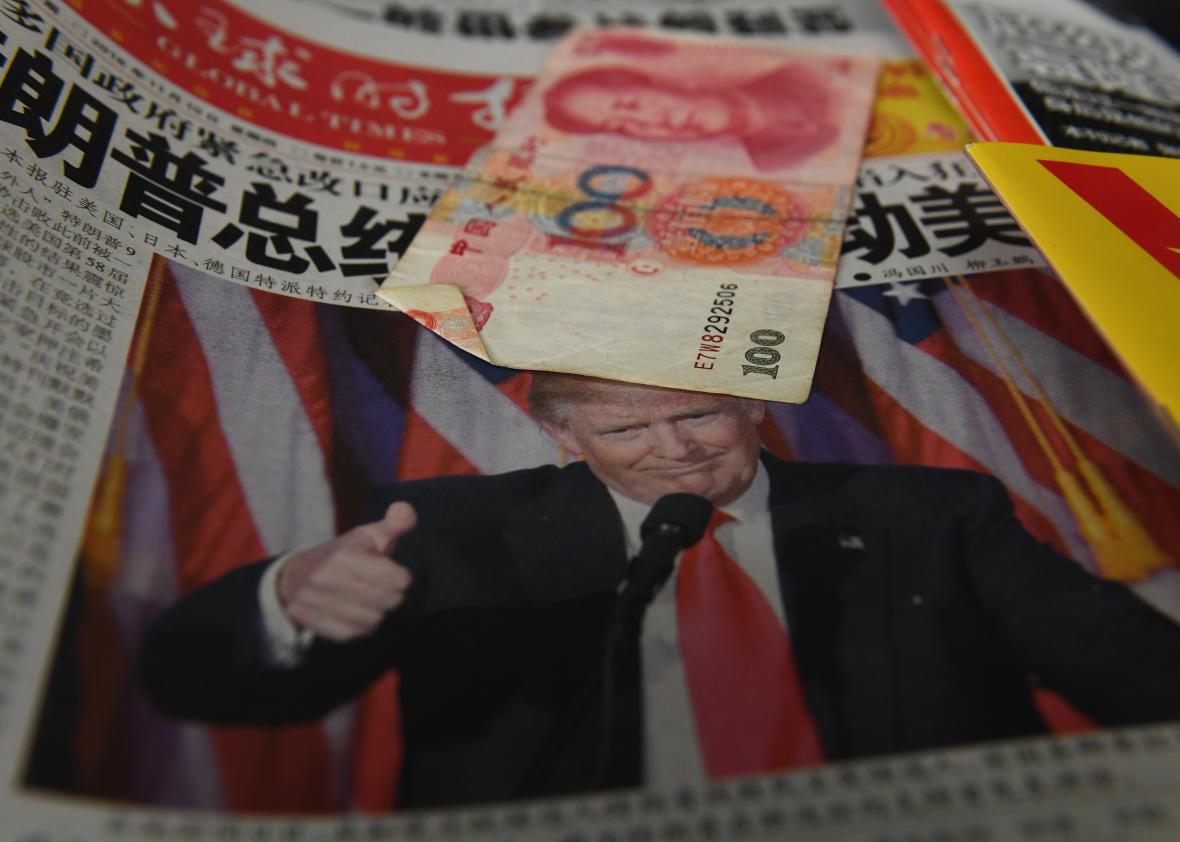Donald Trump’s presidency already appears to be spiraling into an anarchic blur of leaks, lies, and Russian intrigue (Gen. Flynn, we hardly knew thee). But amid all the chaos, the White House’s economic team seems to be inching toward sanity on one very important issue: how to deal with China without starting a trade war.
During his presidential campaign, Trump frequently promised he would label the People’s Republic a currency manipulator as retaliation for its predatory trade practices. This didn’t make much sense, since China stopped pushing down the value of the yuan in order to boost exports a long time ago. Recently, Beijing has been busy doing the exact opposite, burning through its foreign exchange reserves in order to prevent its currency from collapsing as the economy slows and wealthy investors spirit money out of the country. As with so many things, Trump’s aggrieved, jingoistic view of the world was stuck in a time warp.
Tagging China as a currency manipulator, which Trump said he would do on the first day of his term, wouldn’t have had many practical consequences. But the largely symbolic gesture would still have increased tensions between the world’s two most important economic powers, who will need to cooperate on matters like containing North Korea’s nuclear ambitions. It would have been, you know, suboptimal.
Trump backed off his Day 1 vow shortly before inauguration. And happily, it now seems we may not be heading down that route at all. According to the Wall Street Journal, the White House’s National Trade Council is eyeing a plan that would address currency manipulation generally without aiming at China specifically by deeming the practice an unfair subsidy. That will allow individual companies that feel they’ve been hurt as a result of currency manipulation by China, or by any other country, to bring complaints before the Commerce Department and ask for countervailing tariffs. So, if steelmaker Nucor one day decided Beijing’s currency practices were giving its competition in Shenzhen an unfair edge, it could go to Washington and ask the government to slap a tariff on imported rebar and sheet metal.*
This idea has been kicking around mainstream policy circles for a while. C. Fred Bergsten and Joseph Gagnon proposed it back during 2012, for instance, in a report published by the Petersen Institute for International Economics, an old pillar of D.C.’s free trade–loving establishment. There are at least a couple reasons to like the concept.
First, it doesn’t just target China. Four years ago, Bergsten and Gagnon identified more than 20 different countries they believed were guilty of currency manipulation, from European exporters like Switzerland, petro-states, and a bevy of Asian nations including South Korea and Japan. There was no reason to let them off the hook while singling out Beijing.
Second, the move wouldn’t penalize China, or anybody else, for crimes that exist purely in the mind of Donald Trump. In order to win countervailing duties, companies would need to show that currency manipulation was actually happening and that their business had been harmed by it. That means, given the realities of 2017, it won’t cause any pointless conflict.
“On my reading,—and I’m a hawk—there’s not much manipulation right now, and certainly not in China,” Bergsten told me, adding that it was still a worth trying to deter the practice from coming back. “It’s a good thing to put this remedy in place. But it might not lead to many actionable cases, at least in the near future.”
There are also downsides to the idea. For starters, it might not be legal. According to Bergsten, U.S. law doesn’t explicitly say whether the Commerce Department is allowed to treat currency manipulation as an illegal subsidy. The World Trade Organization’s rules are also murky on that point, he says, meaning the administration’s new approach would likely be challenged. “If the U.S. starts doing cases of this type, it will undoubtedly be contested in front of the WTO,” Bergsten told me. At that point, the administration will have to decide whether to back off its plan or defend it.
Finally, if China ever did start manipulating the value of its currency down again, letting companies complain about it to the Commerce Department might be an inadequate response. As the 2012 report put it:
Countervailing duties offer sector-specific or microeconomic response to the across-the-board macroeconomic problem of currency manipulation. All CVDs now in force in the United States cover only $7 billion of imports, a tiny share of total trade. Hence they are less than an ideal solution.
At the moment, though, the actual modesty of this proposal is kind of comforting. Team Trump is looking for a way to make good on the president’s vow to get tough on currency manipulation, real or imagined, without causing needless havoc. It’s a faint and welcome sign of sanity.
*Correction, Feb. 15, 2017: This post originally misspelled Shenzhen.
